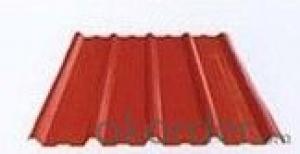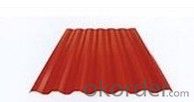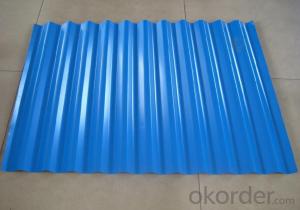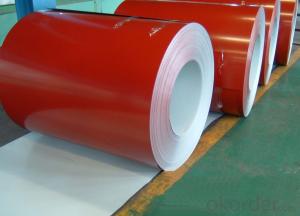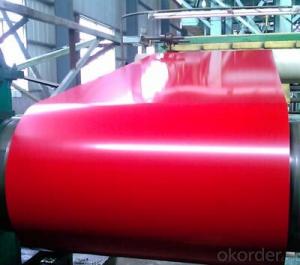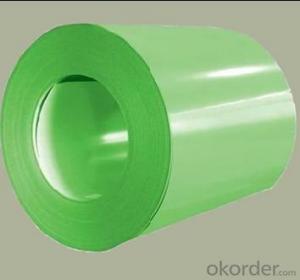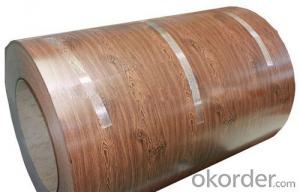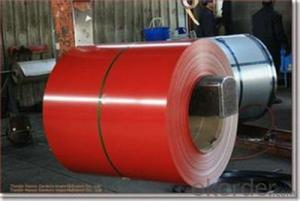RED COLOR CORRUGATED GALVANIZED STEEL SHEET
- Loading Port:
- China Main Port
- Payment Terms:
- TT OR LC
- Min Order Qty:
- -
- Supply Capability:
- -
OKorder Service Pledge
OKorder Financial Service
You Might Also Like
RED COLOR CORRUGATED GALVANIZED STEEL SHEET
1.standard:ASTM BS DIN JIS GB
2.grade:SGCC/DX51D
3.zinc coating:Z40-275g/m2
4.package:export standard package or as per the buyers' requirement
5.Application:mainly used in the field of roof ,outer wall and cabinet,automotive manufacturing, electrical products, locomotives, aviation, precision instrument, canned food, ect.
6.Product features:
(1) good durability, and can be used longer than galvanized steel ;
(2) has good heat resistance, and compared with galvanized steel,under high temperature it does not discolor easily;
(3) has good heat reflecting
(4) have silvery white luxuriant surface;
(5) has machining capability and spraying performance similar to galvanized steel ;
(6) good weldability.
(7)thickness 0.18mm to 1.2mm
Features for corrugated roofing sheet
1) Roll formed by roll forming machines, the thickness and color can be different
2) Easy installation
3) High strength
4) More economic (low cost)
5) They are widely use as the wall or roof of factory, warehouse, garage,
exhibition center and cinema
6) Raw materials: Cold-rolled steel, galvanized steel, galvanized pre-painted
sheet and aluminum sheet
7) A fluted profile makes it suitable for many applications where flat sheet would
not normally be considered. The longitudinal flutes provide rigidity along the
length of the sheet while retaining full flexibility across the width...
- Q: What are the common coil tests performed for quality control?
- The common coil tests performed for quality control include dimensional checks, visual inspections, mechanical property testing, surface defect examinations, and chemical composition analysis. These tests ensure that the coils meet the required specifications and standards, ensuring their quality and suitability for various applications.
- Q: What are the common methods of packaging steel coils for international shipping?
- There are several common methods of packaging steel coils for international shipping. These methods are designed to ensure the safety and security of the coils during transit. One method is the use of wooden crates. The steel coils are placed on wooden pallets and secured with steel bands or straps. The coils are then covered with wooden boards or plywood and nailed or screwed in place to create a sturdy crate. This method provides excellent protection against damage and ensures that the coils remain in place during transportation. Another method is the use of steel frames or skids. The steel coils are placed on steel skids or frames that are designed to support the weight and shape of the coils. The coils are then secured to the skids or frames with steel bands or straps. This method offers a high level of stability and protection, and is commonly used for larger or heavier coils. In addition to wooden crates and steel frames, steel coils can also be packaged using steel containers or shipping containers. These containers are specially designed to transport heavy or bulky items and provide a secure and protective environment for the coils. The coils are loaded into the container and secured with steel bands or straps to prevent movement during transit. Regardless of the packaging method used, it is important to ensure that the steel coils are properly protected from moisture, corrosion, and other potential hazards. This may involve the use of moisture-resistant materials such as plastic or wax paper, as well as the application of protective coatings or wraps. Overall, the common methods of packaging steel coils for international shipping include wooden crates, steel frames or skids, and steel containers. These methods are chosen based on the size, weight, and specific requirements of the coils, and aim to provide maximum protection and security during transit.
- Q: What is the maximum width of steel coils?
- The maximum width of steel coils is subject to variation, influenced by factors like steel type, manufacturing capabilities, and intended usage. Nevertheless, in most cases, steel coils tend to have a maximum width of approximately 2,200 millimeters or 86.6 inches. This width is widely employed in the steel industry for coils of standard sizes. It is worth mentioning that wider widths may be achievable through specialized steel coils or custom manufacturing methods, albeit less frequently and possibly necessitating particular equipment or processes.
- Q: Will a stainless steel mesh screen scratch a titanium cup, or vice versa?I have a titanium french press and am thinking about replacing the included press with an all steel one. I am worried about little flakes of titanium or steel getting ground off into the coffee when the press slides in and out. The original press has a polyester cloth for a screen, so nothing scratches.
- Steel is usually harder than titanium, at least when both materials are hear-treated to give their best strengths. And a harder material can scratch a softer one. So I imagine that the answer is that it will scratch. However much of the rest of your question is unclear and it may be that the amount of friction between the two is so small that no wear will take place, so there could be no problem. The function of the polyester cloth may be vital in reducing this friction, so that unless you keep this part of the original design, the scratching will become worse no matter which combination of metals are used.
- Q: What are the factors that affect the price of steel coils?
- There are several factors that can affect the price of steel coils. These include the cost of raw materials, such as iron ore and coal, which are used in the production of steel. Fluctuations in these commodity prices can have a direct impact on the price of steel coils. Other factors include supply and demand dynamics, changes in production capacity, transportation costs, and global economic conditions. Additionally, factors like trade policies, tariffs, and currency exchange rates can also influence the price of steel coils.
- Q: How are steel coils inspected for defects after recoiling?
- Steel coils are inspected for defects after recoiling by conducting visual inspections, using non-destructive testing methods such as ultrasonic testing or magnetic particle inspection, and conducting measurements to check for dimensional accuracy and straightness.
- Q: How do steel coil manufacturers ensure fair pricing?
- Steel coil manufacturers ensure fair pricing through various measures. Firstly, they conduct thorough market research to understand the current industry trends, demand-supply dynamics, and competitor pricing. This helps them determine a competitive yet fair pricing strategy that aligns with market standards. Secondly, steel coil manufacturers consider the cost of raw materials, production, and operational expenses to determine a reasonable base price. They also factor in economies of scale, as larger production volumes can lead to lower costs per unit. Additionally, steel coil manufacturers often establish long-term partnerships with suppliers to ensure a stable and consistent supply of raw materials at fair prices. This allows them to maintain a reasonable cost structure and minimize price fluctuations. Furthermore, these manufacturers strive for transparency in pricing by providing detailed quotations that break down the cost components. This helps customers understand the factors contributing to the final price and ensures fairness in the pricing process. To enhance fairness, steel coil manufacturers also consider the specific requirements of their customers. They may offer customized pricing based on factors such as order volume, delivery timelines, and value-added services. This approach ensures that each customer receives a price that is commensurate with their unique needs and requirements. Overall, steel coil manufacturers ensure fair pricing by conducting market research, considering cost factors, maintaining transparent pricing practices, and offering customized pricing options. By doing so, they aim to create a fair and mutually beneficial pricing environment for both themselves and their customers.
- Q: I beat fallout 3 and i downloaded broken steel expansion. I have no idea how to get to broken steel in other words i do not know how to start playing it.
- Broken Steel Fallout 3
- Q: How are steel coils used in the agricultural sector?
- Various purposes in the agricultural sector call for the widespread use of steel coils. One primary utilization is seen in the construction of farm machinery and equipment. Tractors, plows, harvesters, and other heavy-duty machinery are frequently manufactured using steel coils. The exceptional strength and durability of steel make it an ideal material for such applications, as it can endure the challenging conditions of agricultural work. Furthermore, agricultural buildings and structures heavily rely on steel coils in their construction. Steel is renowned for its superior structural integrity, making it a popular choice for barns, storage units, and other agricultural facilities. Steel coils are frequently employed to establish the framework and support systems of these structures, providing stability and long-lasting durability. Moreover, irrigation systems also rely on steel coils in their production. Steel coils are often used to create the pipes and tubes used for water transportation in agricultural irrigation systems. Steel's resistance to corrosion and its ability to handle high-pressure flows make it an excellent choice for this particular application. To summarize, steel coils hold a critical role in the agricultural sector. Whether it be the construction of farm machinery and buildings or the development of irrigation systems, steel's strength and durability make it the preferred material in this industry.
- Q: I am about to do a welding project and we are instructed to only use mild steel. I want to use found objects like coins, spoons, bottle caps, screws, and other small fasteners. Are these mild steel? What other objects can I use that are mild steel?
- not really. Coins aren't usually made from steel (e.g. an US cent is mainly zinc which will melt with releasing toxic fumes while welding), spoons are usually stainless steel (which is not mild steel), bottle caps can be steel but also aluminum. Fasteners can be made from a wide variety of metals. Generally mild steel is steel with a relatively low content of carbon (2%) which makes it easier to weld. It's used a lot for structure in building (e.g. rebar). Mild steel is also cheaper than other kinds of steel. Tools are usually made from high carbon steel. Generally I'd recommend to go to the scrap yard and pick up some shapes and pieces you like if you don't mind having to clean the rust off. Most will be mild steel. Welding small and thin pieces is much more challenging than welding larger pieces of metal. You are more likely to melt a bottle cap than weld it. Also your steel needs to be clean (no paint, sandblast or brush rust off). I would highly recommend to talk your project over with your teacher before you get all frustrated.
Send your message to us
RED COLOR CORRUGATED GALVANIZED STEEL SHEET
- Loading Port:
- China Main Port
- Payment Terms:
- TT OR LC
- Min Order Qty:
- -
- Supply Capability:
- -
OKorder Service Pledge
OKorder Financial Service
Similar products
Hot products
Hot Searches
Related keywords
